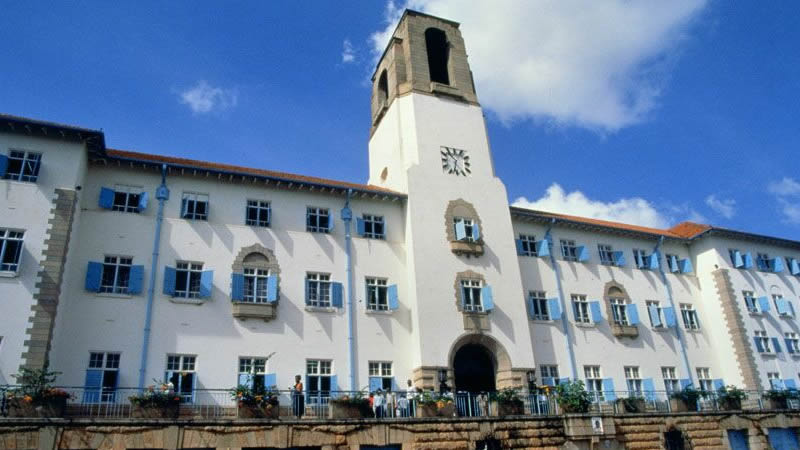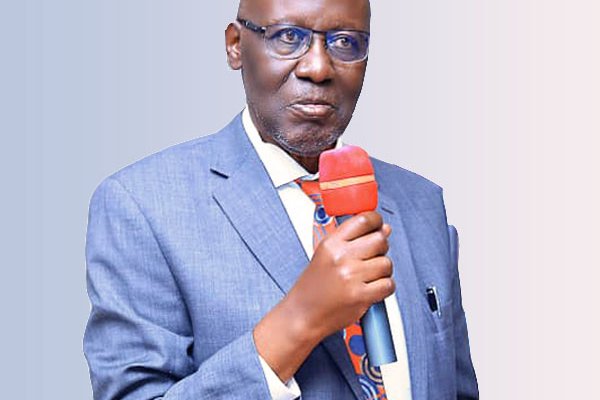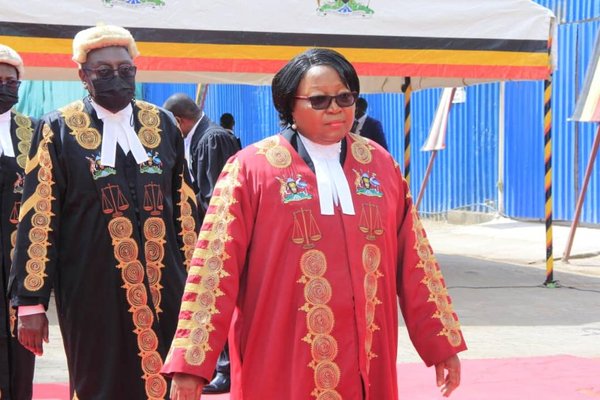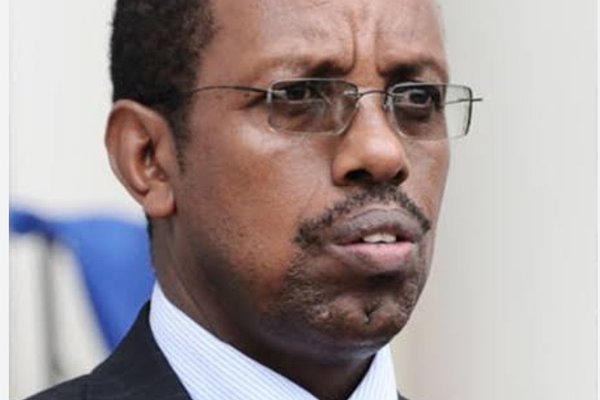By Tuhirirwe Karane
In 1960, as Uganda approached independence, Dr. Martin Jerome Okech Aliker established the first private dental practice in the nation, marking the beginning of an extraordinary career. This career would see him become a prominent businessman and influential public servant. But who exactly was Dr. Martin Aliker? The Legacy profiles a gentleman whose name has resonated in Uganda’s corporate and political corridors for over 60 years.
Childhood
Born to a county chief in 1928, Dr. Aliker’s life story is not a typical rags-to-riches tale but one where a privileged birth opened doors to a successful life. In his memoirs, The Bell is Ringing, Aliker shares that his father “flourished in the era of 'indirect rule,' the system under which the British sought to run the rural areas of Uganda, along with other African colonies and protectorates, through bolstering what they saw as the traditional system of government of chiefs.”
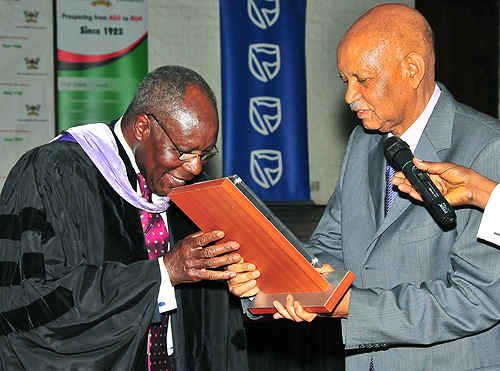
Dr. Martin Aliker receives an award from Prof. Mondo Kagonyera at Makerere University
A conversation with Sir Apolo Kagwa, the then Katikkiro (Prime Minister) of Buganda, persuaded Aliker’s father, Lacito Okech, that King's College, Budo was the best school for his children. Founded in 1906 by the Church Missionary Society, this secondary school was established to educate the sons of Uganda’s kings and chiefs, preparing them for leadership roles in the emerging nation. Following this advice, Aliker joined his elder siblings, Daudi Ocheng and Janet, at this prestigious institution.
It was at Budo that his elder brother, Ocheng formed a friendship with Edward Mutesa, heir to the Kabaka, which extended into political loyalty in Uganda’s post-independence politics. Aliker himself was very happy at Budo, where he made lifelong friends who would become leading citizens of Uganda. “I enjoyed the games, learnt a lot from some inspiring teachers, began to see that there was a world beyond Acholiland and perhaps even that I might have a role to play in it,” he admitted in his memoirs.
Enter Makerere
Dr. Aliker entered Makerere College in January 1948, an institution widely recognised as the best for tertiary education in East Africa. Elated by his admission, he was even more thrilled to find his best friend, Herbert Kanabi Nsubuga, had also been admitted. Nsubuga would later become a Minister of Animal Resources, a professor at Makerere, and Aliker’s best man. Aliker also shared a room with Fred Mpanga, who later gained a scholarship to study law in Britain and eventually became the Attorney General of Buganda Kingdom.
At the time of Aliker's entry, Makerere was transitioning from a school to a university college and still retained many school-like characteristics, such as students wearing uniforms. Aliker studied the equivalent of A levels in History, Geography, and Social Studies.
"The annual Shakespeare production was a highlight of Makerere life. In my final year, Margaret MacPherson directed Julius Caesar. I was the understudy to Brutus, a part played by Kunambi from Tanganyika. On the day the governor was coming, Brutus decided at ten o'clock in the morning that he was unfit to perform that evening. I was not as well prepared as I should have been. There was intensive rehearsal, desperate learning of the lines, and the expenditure of much nervous energy until an hour before the curtain was due to go up when Brutus strode into the studio to declare that he was fit enough to perform after all. There was relief on all sides!"
Aliker recalls that a notable feature of his time at Makerere was the racial division: the students were all Black, and the lecturers were White. This created a kind of superiority/inferiority dynamic.
Aliker was no stranger to the university's social life, noting that the most important event on the calendar was the dance at the Main Hall. "If there was no dance at the college, we went looking for one. One night we walked from Makerere to Kibuye to a nightclub called the 'White Nile.' The entrance fee for ordinary men was two shillings, students paid one shilling, and women entered free. I paid my shilling to enter. The band started playing, and I asked a certain woman for a dance. She said she couldn't dance without first drinking beer, or in Luganda, 'Nze bwesinywa bia, sisobola kuzina.' In those days, a big bottle of beer cost one shilling, which I didn't have, so I couldn't dance with her. I promised myself that one day I would have many shillings to spend! The journey back to college was on foot again. There were no taxis or boda bodas. University dances were strictly for students, except for the women, whom the college authorities closely vetted."
Education outside Uganda
Dr. Aliker was fortunate to win a scholarship to Northwestern University in Chicago, Illinois, where he studied political science and graduated with a Bachelor of Arts degree. He vividly recalls his father celebrating his departure to the USA by killing a bull and inviting the whole village for a feast and dancing that lasted late into the night.
Later, he was awarded a Fulbright Scholarship to study dental surgery, also at Northwestern, where he earned his Doctor of Dental Surgery degree. However, to practice dentistry in Uganda, he needed a British qualification. “I was very fortunate that Professor John Osborne from Birmingham University was on a sabbatical at Northwestern during my final year. When I told him about my situation, he immediately invited me to Birmingham to join his department of prosthetics. He assured me that what I had covered at Northwestern was more than Birmingham required. To take the examination of the Royal College of Surgeons, I would need to spend just one week in each department.” He sailed through the process with ease, obtaining the much-desired qualification, and was awarded the title of Fellow of the Royal College of Surgeons by the Royal College of Surgeons of England.
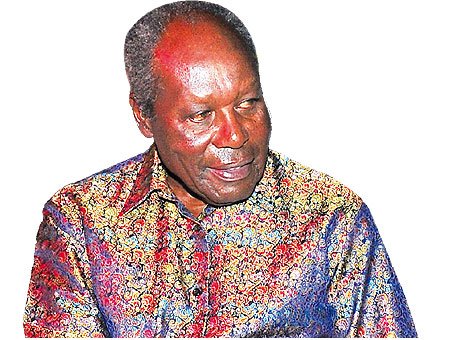
Dr. Martin Jerome Okech Aliker
It was during his time at Northwestern that he met his future wife, Agnes Camille. They were married in the summer of 1959 when she came to Birmingham, and they exchanged vows at the Birmingham registry office.
Back to Uganda
On getting back to Uganda, Aliker was offered a 30-month contract for the post of dental officer with the Ministry of Health to be based at Mulago Hospital. “People widely regarded Mulago as the best hospital in east and central Africa. Its medical school was attached to the adjacent Makerere University College and plans were well advanced for its development as the main referral centre for the whole of Uganda. I had spent a long time in training and was impatient to start work. My initial experiences were, however, disappointing. The equipment was archaic and the work very basic. My boss, Philip Aspley, only allowed me to do basic extractions and fillings and this made me feel that my advanced training was underutilised,” he recalls.
It is against this background that he was transferred to a European hospital in Nakasero where the Pearl of Africa Hotel previously stood. He served at this hospital briefly before he learnt of an Englishman, the then sole private dentist in Kampala was selling up and moving to Nairobi. “I took a loan from the Uganda savings and Credit Bank to buy the practice and, after working for the government for 14 months, resigned my position.”
It was to follow that in 1960 Aliker had now established himself as the first Ugandan to run a private practice in dentistry and was for many years, one of the most sought-after dental surgeons in East Africa. He practiced in Uganda from 1959 to 1972, and in Kenya from 1972 to 1995.
During his practice, Aliker worked on a wide range of clientele including Ugandan presidents of that time. “On 19th December 1969, Obote was shot in the mouth in an assassination attempt while he was leaving Lugogo Stadium in his presidential car. He was badly injured and was taken straight to Mulago Hospital. Obote's injuries were not critical, but the bullet caused serious damage to his mouth and teeth. The professor of surgery at Mulago, Sir Ian McAdam, phoned me at home and told me, 'this is a job only you can do. Come straight away?” Aliker, working with the rest of the medical team, treated the wound, saved most of the teeth, and Obote was back in his office a week later.
Around 1970, the then President Amin brought his mother for surgery. “She had been in great pain from a heavily swollen abscess in the jaw. By the time I saw her, the body itself had isolated the problem and it was a relatively straightforward process to drain the pus without the need for an operation. Within a few days she had wholly recovered, and Amin was delighted with what I had been able to do.”
Life in business and public service
Speaking at the Martin Aliker Invitational Lecture held at Makerere University in 2012, Dr. William Kalema highlighted that “Martin’s long engagement with the business world has been that of an investor, a shareholder in successful businesses, and as a Director and Chairman of the Board of several reputable companies. Thus, his most direct impact has been through corporate governance.”
Starting in the 1960s, Aliker began buying shares in blue-chip companies, including Uganda Commercial Bank and the National Insurance Company. At the time of his death, Aliker was known to be a shareholder in several publicly traded Ugandan companies, such as Stanbic Bank Uganda, Uganda Clays Limited, Nation Media Group, National Insurance Corporation, and East African Breweries. He served on the boards of many of these companies and was the chairman of Uganda Clays Limited.
In his successful role as a corporate leader, Dr. Kalema noted that Aliker exhibited qualities such as personal integrity, wisdom and foresight, business acumen, social responsibility, and leadership.
Aliker also played a leading and honorable role in affairs of state. He served as Minister of State for Foreign Affairs in Charge of International Cooperation and acted as an emissary of the President in several delicate situations concerning neighboring countries to the North and East. He also served as Senior Presidential Advisor, Special Duties, to H.E. the President of Uganda. Additionally, in 1979-1980, he was a Presidential Advisor to Presidents Yusuf Lule and Godfrey Binaisa. Aliker had earlier been a key player at the Moshi Conference, which brought together several exiled Ugandan leaders to prepare for Uganda’s governance in the post-Amin period.
The Observer newspaper quoting his memoirs also noted that Aliker was a go-between for government and LRA rebels. “One day he received a letter purportedly written by rebel leader Joseph Kony asking for medicines for gonorrhea, cholera, and diarrhoea. He forwarded the letter to Museveni who ordered then army commander, Maj Gen Mugisha Muntu, to put together the drugs for LRA. Aliker drove them there. When they took delivery of the medicines, they prayed for long life for President Museveni…”
Back to Makerere University
At its 130th meeting held on February 20, 2014, the Makerere University Council approved the establishment of the Makerere University Endowment Fund to reduce the institution’s dependence on tuition and government subvention. The university embarked on a search for an experienced corporate manager to lead this initiative, with the core objectives of mobilising and receiving funds for the benefit of the university, investing those funds, and funding activities that actualise the university's mission.
In his eulogy, the then acting Vice-Chancellor of Makerere University, Prof. Umar Kakumba, noted, “Under Aliker’s stewardship, the Inaugural Board had, by the end of their term in 2019, grown the Makerere University Endowment Fund's onshore fund from nothing in 2014 to UGX 1.5 billion, while the offshore fund was valued at 1.5 million GBP.”
Reflecting on his appointment, Prof. Kakumba added, “The name Dr. Martin Aliker had stood the test of time, being synonymous with dedicated service, impeccable integrity, and proven business acumen, making him a distinguished source of inspiration to both the young and old. It was therefore with great pride that Makerere University, on July 17, 2014, appointed him as the Chairperson of the pioneer Board of Trustees in charge of the Makerere University Endowment Fund (MakEF).”
Dr. Aliker passes on
On April 15, 2024, the business and public sector titan Dr. Martin Jerome Okech Aliker breathed his last at Nakasero Hospital in Kampala at the age of 95. He is survived by his wife, Camille, and their four children: Julie, a teacher; Martin, an athlete; Philip, an economist and lawyer; and Paul, a dentist.
In mourning him, Philip reflected on his father's legacy, stating, "He projected an enviable brand that transcended beyond professionalism. He was a hardworking man, a storyteller, a great dad, and a wonderful husband to my mother. All my life, I had never seen my father pick a fight with my mother."
His widow, Camille Aliker, shared her own heartfelt tribute, saying, "Martin was a family man. He loved me so much and loved his children dearly. All he ever wished for was the joy and peace of his family."
Dr. Martin Aliker provided an unmatched contribution to the world of business and corporate governance. His legacy of integrity, wisdom, and leadership left an everlasting imprint on Makerere University and the broader community and many will hold his memory dearly, cherishing the inspiration and guidance he provided to generations of students and professionals.
Related News
![]() Please join hands with the Makerere University Endowment Fund as it works towards attracting & retaining the best faculty, providing scholarships, and investing in cutting-edge research and technology.
Please join hands with the Makerere University Endowment Fund as it works towards attracting & retaining the best faculty, providing scholarships, and investing in cutting-edge research and technology.
